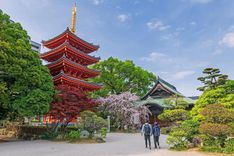Japan might be known for its spotless streets and world-class healthcare, but don’t let the calm fool you. From brutal summer humidity to mountain trails that’ll wreck your knees, it’s easy to run into trouble if you’re not ready. And while the sushi’s incredible, not every stomach handles raw fish like a local’s. Staying healthy in Japan isn’t complicated — but it does take a bit of common sense. Here’s how to dodge the usual mishaps and keep your trip on track.
Essential vaccines for traveling to Japan
Japan is clean, safe, and has excellent healthcare — but that doesn’t mean you should skip the travel clinic.
Which vaccines do you need?
You probably won’t need anything out of the ordinary, but it’s worth checking your vaccination record before you go. Some jabs are standard, others depend on how deep you’re planning to dive into rural Japan or outdoor adventures.
Mandatory vaccines
None – Japan doesn’t require any vaccines for entry, unless you're coming from a country where yellow fever is a risk.
Recommended vaccines
- Tetanus and diphtheria – A no-brainer. If it’s been over 10 years since your last booster, get one.
- Hepatitis A – Rare, but not impossible. Protects you from contaminated food or water — especially useful if you’re eating at casual izakayas or rural spots.
- Hepatitis B – Still relatively common. Worth considering if you’re staying long-term, getting a tattoo, or might need medical care.
- Japanese encephalitis – You’re not likely to catch it in Tokyo, but if you're camping, hiking, or traveling in the countryside during summer, it’s something to think about.
- Rabies – Japan’s officially rabies-free, but if you’re planning on hiking in remote areas or can’t resist cuddling stray cats in temple towns, it’s worth discussing with a doctor.
Pre-travel health checklist
Before you board that flight, make sure you’re prepped for Japan’s climate swings, long train days, and those mountain hikes you definitely didn’t train for. Here’s your no-nonsense health checklist to stay one step ahead.
Packing for a healthy trip
No need to bring your whole medicine cabinet — just a few smart choices will do the trick.
- Sunscreen – Japan’s sun can sneak up on you, especially in summer. Go for SPF 50+.
- Mosquito repellent – Useful if you’re visiting in warmer months or heading to rural areas. Look for at least 30% DEET.
- Oral rehydration salts – Long hikes, hot onsens, and humid summers can leave you wiped out. These help.
- Basic first-aid kit – Include band-aids, antiseptic, painkillers, antihistamines, and blister patches (your feet will thank you after temple marathons).
- Prescription meds – Japan has strict rules on medication imports. Bring enough for your stay, and carry a doctor’s letter just in case.
- Hand sanitizer – Japan’s clean, but you'll still come across the odd soap-free public bathroom.
Pre-travel health check
Visit a travel clinic – Do this at least 6–8 weeks before you go. Even though Japan doesn’t pose many health risks, this is your chance to update any vaccines and double-check your prescriptions.
How to avoid mosquito-borne illnesses
Think Japan’s bug-free just because it’s ultra-clean? Not quite. Mosquitoes are a thing here too — especially in summer and rural areas. While you don’t need to worry about malaria, there are other illnesses you can pick up if you’re not careful.
Japanese encephalitis
This is the big one to know about. It’s rare, but serious — and spread by mosquitoes, mostly in rural areas during the warmer months (May to October). You're more at risk if you’re staying in the countryside, especially near rice paddies or pig farms.
Prevention tips:
- Consider the vaccine if you’re spending a lot of time outdoors or in rural areas for more than a month.
- Use insect repellent with DEET or picaridin, especially at dawn and dusk.
- Wear long sleeves and pants when hiking or camping.
- Stay in air-conditioned or well-screened accommodation when possible.
Dengue fever
There’s been the occasional outbreak in Japan — most notably in Tokyo’s Yoyogi Park a few years back — but it’s not widespread. Still, it doesn’t hurt to take precautions in the summer, especially if you’re outdoors in urban parks or near water.
If you do get dengue: You’ll feel it — high fever, rash, intense joint pain. Hydrate, rest, and skip anti-inflammatories like ibuprofen. Go see a doctor.
Staying healthy in Japan
Japan is one of the safest, cleanest countries you can visit — but that doesn’t mean you should wing it. Between humid summers, allergy seasons, and the occasional health curveball, it pays to be prepared. Here’s what to keep in mind.
Wildlife and rabies: low risk, still worth noting
Japan is officially rabies-free, so you won’t need the vaccine unless you're doing something unusual like volunteering with animals or exploring remote islands with no access to medical care.
- Monkeys in places like Jigokudani or Arashiyama can get aggressive, especially if you're carrying food. Don’t try to pet or feed them.
- If you are bitten or scratched, wash the area thoroughly, disinfect it, and see a doctor, even though rabies isn’t present — other infections are still possible.
Food and water safety: safe, but know your limits
- Tap water is safe everywhere — even in train station bathrooms.
- Raw food is common — sushi, sashimi, even raw egg. It’s generally safe, but if your stomach’s not used to it, go easy at first.
- Street food is rare, but festival stalls and convenience stores are part of the food culture. Stick to fresh-looking items from busy spots with high turnover.
Stomach trouble
You’re unlikely to get food poisoning, but jet lag, rich food, and heat exhaustion can still mess with your gut.
- Oral rehydration salts help if you're dehydrated or lose fluids.
- Stick to plain foods — rice, bananas, miso soup — if your stomach’s off.
- Avoid anti-diarrheal meds unless you really need them.
Seasonal allergies
Springtime in Japan means cherry blossoms — and a serious pollen problem. Cedar and cypress trees release clouds of pollen starting in February.
- Bring antihistamines if you’re prone to hay fever.
- Locals wear masks for a reason — you might want one too.
Heat and humidity
Japanese summers are no joke. From June to September, it's hot, sticky, and surprisingly dangerous if you're not prepared.
- Hydrate constantly — vending machines are everywhere, so use them.
- Avoid outdoor activities between 12pm-3pm in peak summer.
- Take breaks indoors — convenience stores, cafés, train stations all have air con.
Air quality
Generally good, especially outside major cities. But Tokyo, Osaka, and Fukuoka can experience short-term smog, especially in spring or during heatwaves.
- If you have asthma or respiratory issues, consider a lightweight N95 mask.
- Masks are common and accepted, so you won’t feel out of place wearing one.
Why travel insurance is a must
Japan has top-tier healthcare — but it’s not free, and it’s definitely not cheap for visitors. If you twist an ankle in the mountains, catch a nasty stomach bug, or just lose your luggage on the Shinkansen, you’ll want backup. That’s where travel insurance comes in. Here’s what you need to know before choosing a policy.
Medical care in Japan: excellent, but pricey
You won’t have trouble finding a clean, efficient hospital or clinic. The issue? As a tourist, you’ll be paying full price unless you’re insured.
- Doctor’s consultation: $50–$150
- Emergency room visit: $150–$500
- Hospital stay (private room): $300–$1,000 per night
- Surgery: $2,000–$30,000 depending on the procedure
- Medical evacuation to your home country: $20,000+
Japan’s public healthcare is great — if you’re a resident. As a tourist, even minor issues can rack up serious costs without insurance.
What to look for in a travel insurance policy
Not all policies are created equal. Look for one that includes:
- Medical coverage – At least $100,000 is a good baseline.
- Emergency evacuation – Just in case you need a flight home for treatment.
- Trip cancellation and delay – Useful if typhoons or other surprises mess with your plans.
- Lost or stolen belongings – Especially if you're carrying expensive gear.
- Adventure activity coverage – Includes hiking, skiing, or diving — all common Japan bucket-list activities.
Trusted travel insurance providers
Several companies offer solid policies for travelers headed to Japan. A few that consistently get good reviews:
- World Nomads – Known for covering high-risk activities like skiing and hiking.
- SafetyWing – Great for long-term stays and digital nomads.
- Allianz Travel – Offers high medical limits and good customer support.
- IMG Global – Solid medical coverage and emergency support worldwide.
Emergency help: what to do if you get sick
Even with the best prep, stuff happens — a dodgy sashimi roll, a hiking sprain, or a fever that hits mid-temple tour. Japan’s healthcare system is solid, but knowing who to call and where to go makes all the difference.
Emergency numbers
- Medical emergency / Ambulance / Fire: 119 – (No area code needed. Just say “Kyūkyū desu!” if you need an ambulance — or ask for an English-speaking operator.)
- Police: 110
- Japan Visitor Hotline: 050-3816-2787 (24/7 multilingual support for emergencies, travel advice, and more)
English-speaking hospitals and clinics
Most hospitals in major cities offer some level of English support, but these are known for being tourist-friendly:
Tokyo
- Tokyo Midtown Medical Center – Upscale, with full English support.
- St. Luke’s International Hospital – Excellent care, large expat community.
- Tokyo Medical and Surgical Clinic – Tailored for foreigners, English-speaking staff.
Kyoto
- Kyoto Takeda Hospital – Limited English, but reliable for emergencies.
- Kyoto University Hospital – More for serious or specialist care.
Osaka
- Osaka Red Cross Hospital – Large, with a helpful international desk.
- Kobe Kaisei Hospital – Good access for foreigners.
Need minor help?
Pharmacies (薬局 yakkyoku) are everywhere and often open late. Ask for one with an “Eigo OK” (English spoken) sign — especially in tourist areas.
Staff can help with cold meds, stomach issues, and minor injuries. For prescription meds, you’ll need to visit a clinic first.











